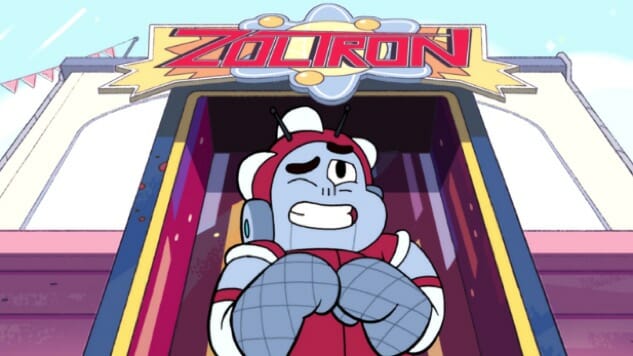Steven Universe Sees Sadness in “Future Boy Zoltron”

Last week, we got a look at the darkness bottled up within Steven Universe, a boy who’s always been much better at solving others’ problems than reckoning with his own. As deeply emotionally satisfying as it was to spend time in that hole, it was probably necessary for the show to fish us back out—remember, lots of kids watch Steven Universe, and they shouldn’t be deprived of all silly levity. “Future Boy Zoltron” planted us back on our feet with a typical example of Steven getting into an absurd situation and, from there, laying down some real talk with someone who needs it. This won’t be an episode we look back upon as a classic, but there was enough interesting material to merit some discussion, starting with…
THE INEVITABLE CONCLUSIONS OF A DEPRESSED MIND
As many various mental states as this show has depicted, we’ve only really seen it take depression head-on once: when Amethyst went through her rough patch after getting poofed by Jasper. And even though it was a marvelous depiction of the disorder—I’m thinking specifically of her malaise in “Steven vs. Amethyst”—at the time it was framed more in view of Amethyst’s raging inferiority complex. Last night’s Mr. Frowney was the first character we’ve met who you could reasonably infer suffers from clinical depression or dysthymia (less severe but more chronic than major depression).

In a way, he’s a caricature of the illness, what with his trench coat, his muted color scheme and a face of which every constituent part seems to droop. That bothered me a little bit, as Steven Universe has thrived on nuanced, realistic characters. You could argue that Mr. Frowney’s appearance is a visual manifestation of a depressed person’s mental state, perhaps. But he’s given a history with Mr. Smiley, a context within the show’s world that forces us to consider him as a real character. And real depressed people, quite simply, aren’t often as stereotypically depressed-looking or depressed-sounding as Mr. Frowney. It was hard to invest in his plight—much harder than it was to get emotionally involved with Amethyst’s self-destructive tryst a few weeks ago—because it was hard to buy him as a person. This show has set the bar too high for me to casually accepted hackneyed characters.
What Steven Universe DOES get right, though, is the cognitive process by which depressed people view the world. One of the primary symptoms of the condition is a persistent negative thinking pattern, wherein the affected person interprets everything they experience in a pessimistic light. Depression is incredibly tricky to defeat without intervention because people who suffer from it are unable to wrench themselves out of the rut they’re in; they’re only capable, so long as the depressive episode lasts, of digging themselves deeper. Positive thoughts about themselves and the world, which would be a salvo, become nearly impossible to entertain, and the cycle persists until the underlying causes of the ailment are remedied, ideally by a combination of pharmaceutical intervention and cognitive-behavioral therapy.

Garnet’s future vision is a brilliant way to visualize a depressed person’s distorted thinking. We’ve heard it described before as the ability to see multiple possible courses that spacetime might follow—I’d dig deeper in terms of the scientific implications, but I don’t want to get stuck in that quantum tunnel. For the purposes of “Future Boy Zoltron,” all that’s important to note is that future vision should enable its bearer to select the best possible path forward. It’s a really useful tool… unless you’re trying to help a depressed person overcome a negative thinking pattern. There’s no witticism that Steven can deliver on the spot that will cure Mr. Frowney of his depression or even place him on the road to recovery, because as much as Garnet has said that everyone chooses their own future, that proposition has become psychologically impossible for him at this moment; he’ll helplessly and inevitably twist his perceptions into some contortion that fits his dismal self-esteem. Steven is unable to help, because he’s not trained in cognitive-behavioral therapy and he can’t prescribe Prozac. That leaves our empathy hero pretty sad himself.
-

-

-

-

- Curated Home Page Articles By Test Admin October 21, 2025 | 3:10pm
-

- Curated Home Page Articles By Test Admin October 21, 2025 | 2:57pm
- Urls By Test Admin October 21, 2025 | 2:57pm
- Curated Home Page Articles By Test Admin October 21, 2025 | 2:55pm
-

-

-

-

-

-

-

-

-

-

-

-

-

-

-

-

-

-

-

-

-

-

-

-

-

-

-

-

-

-

-





































